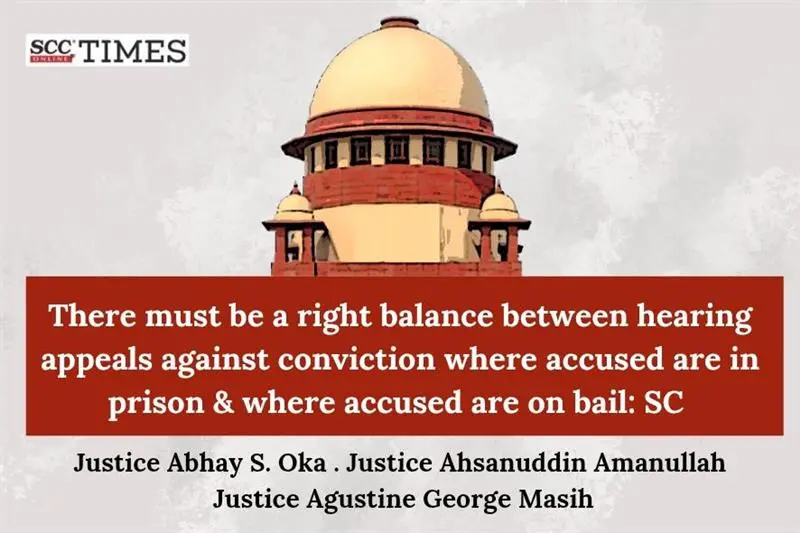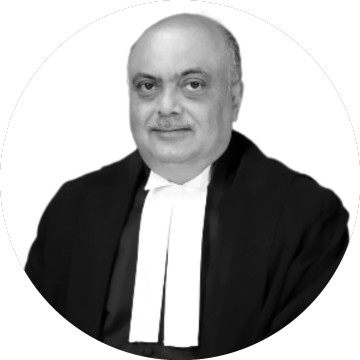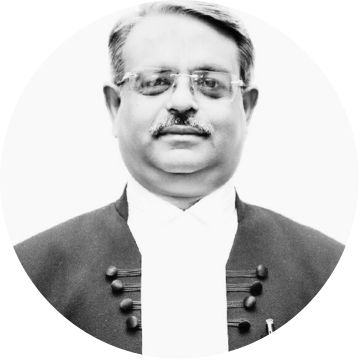Supreme Court: While considering the instant appeal filed by the State of Madhya Pradesh against the impugned order the High Court whereby the Court let go of the respondents (accused persons) taking into account their old age; the 3-Judge Bench of Abhay S. Oka*, Ahsanuddin Amanullah and Agustine George Masih, JJ., opined that considering the pendency of very old criminal appeals, priority is usually given to the hearing of the appeals where the accused are in prison. The appeals against conviction where the accused are on bail take a backseat. However, a right balance must be struck by taking up for hearing even some of the old criminal appeals against conviction where accused are on bail. Therefore, it is desirable that certain categories of appeals against conviction where the accused are on bail should be given priority.
Background:
On 1-11-1989, the accused persons allegedly with common intention and object assaulted the prosecution witnesses (PW) and the deceased person after one of the PW cut the tail of a buffalo belonging to the accused persons. This assault eventually led to the death of one of the victims.
The accused persons were tried for the offences punishable under Sections 147, 452, 302, 325, and 323 read with Section 149 of the IPC. The Trial Court held them guilty and convicted them for the offences punishable under Section 147 and Sections 452, 302, 325, and 323 read with Section 149 of the IPC. For the offences punishable under Section 302 read with Section 149 of the IPC, they were sentenced to undergo life imprisonment. For other offences, separate punishments were imposed, which were ordered to run concurrently.
Madhya Pradesh High Court in its impugned judgment passed in 2017 had set aside the conviction of the accused persons for the offences punishable under Section 302 read with Section 149 of the IPC. The High Court converted the conviction under Section 302 into the second part of Section 304 of the IPC. The conviction for the other offences were confirmed. The High Court further noted that the incident was of the year 1989 and the first accused was nearly eighty years old, and other four accused persons were also above the age of seventy. The accused persons were thus let off by the High Court with the sentence already undergone.
Court’s Assessment:
Perusing the instant matter, the Court noted that the conviction of the accused had been brought down from Section 302 to second part of Section 304 of the IPC. The appeal against conviction remained pending for 21 years. It was further pointed out that the accused persons were on bail during the trial and the appeal, and this was one of the circumstances taken into consideration by the High Court. The other circumstance considered was that by the time when the High Court had dealt with the appeal, the incident was twenty-eight years old.
The Court further pointed out that neither the cause of death mentioned in the post-mortem report nor the evidence of PW-17 prove that the injuries inflicted upon the deceased resulted in his death. Moreover, the death occurred 15 days after the incident.
The Court took note that there was no appeal preferred by the accused. However, the fact remains that the medical evidence creates a serious doubt as to whether injuries allegedly inflicted by the accused persons caused the death of the deceased. Therefore, there is a serious doubt whether even Section 304 of the IPC could have been applied, as the medical opinion does not support the theory of homicidal death of the deceased. “That is why it is not possible to interfere with the judgment of the High Court directing that the respondents-accused should be let off for the offence under Section 304, read with Section 149 of the IPC, on the sentence that has been undergone”. The Court emphasised that when the High Court decided the appeal in 2017, the incident was already twenty-eight years old and the instant appeal came is being decided in 2024, which makes the incident is almost thirty-six years old.
Furthermore, when the judgment of the High Court was delivered, at least five accused were above seventy years of age, and one of them was of the age of about eighty years. A substantial amount of Rs.16,000/- each has been imposed by the High Court by way of fine. Therefore, the Court found that it will not be appropriate to interfere with the impugned judgment of the High Court.
In its concluding remarks, the Court stated that in all the major High Courts in the country, there is a huge pendency of criminal appeals against conviction and acquittal. The old age of the accused and the long lapse of time from the commission of the offence can always be a ground available to give some priority to the appeals against conviction of the accused on bail. If the appeals against conviction where the accused are on bail and especially where a life sentence has been imposed are heard after a decade or more from its filing, if the appeal is dismissed, the question arises of sending the accused back to jail after a long period of more than a decade. Therefore, certain appeals against conviction where the accused are on bail, should be given priority.
CASE DETAILS
|
Citation: Appellants : Respondents : |
Advocates who appeared in this case For Petitioner(s): For Respondent(s): |
CORAM :










